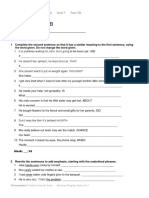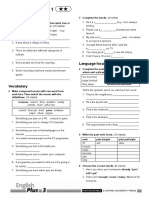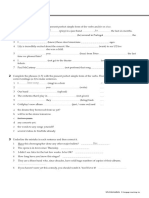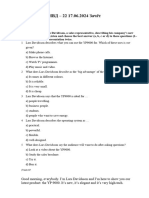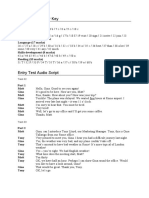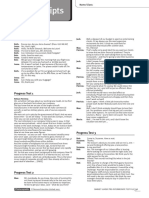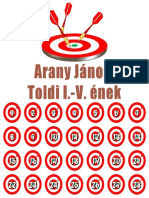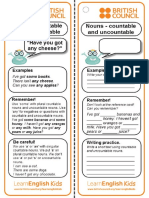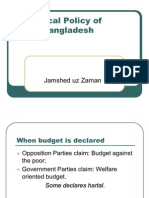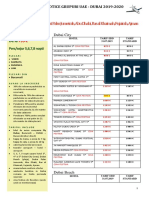Progress Test 4
Progress Test 4
Uploaded by
Grasics TimiCopyright:
Available Formats
Progress Test 4
Progress Test 4
Uploaded by
Grasics TimiOriginal Title
Copyright
Available Formats
Share this document
Did you find this document useful?
Is this content inappropriate?
Copyright:
Available Formats
Progress Test 4
Progress Test 4
Uploaded by
Grasics TimiCopyright:
Available Formats
Name_______________________________________ Class______________________________
Progress Test 4 (Units 10–12)
LISTENING
Track 07
1 You will hear to Lars Davidsson, a sales representative, describing his company’s
new product, the YP9000. Listen and choose the best answer (a, b, c or d) to these
questions (1–5). You will hear the presentation twice.
1 Lars Davidsson describes what you can use the YP9000 for. Which of these uses is
not given?
a) Make phone calls.
b) Browse the Internet.
c) Watch TV programmes.
d) Play music and video.
2 What does Lars Davidsson describe as the ‘big advantage’ of the YP9000?
a) It comes in different colours.
b) It is reliable.
c) It is very small.
d) It is cheap.
3 Lars Davidsson says that the YP9000 is ideal for …
a) people travelling.
b) business people.
c) students.
d) people who want to save energy.
4 Lars Davidsson describes the operating system as …
a) practical.
b) powerful.
c) flexible.
d) well-designed.
5 What does Lars Davidsson say the audience will want to do after asking questions?
a) Look at a video about the YP9000.
b) Study the sales brochure.
c) Try it.
d) Buy it.
PHOTOCOPIABLE © 2006 Pearson Longman ELT 1
Track 07
2 Listen again and complete the chart (6–10).
The YP9000
6 Size: __________ cm long by __________ cm thick
7 Weight: __________ grams
8 Talk time: __________ hours
9 Memory: __________ Mb
10 Price: $__________
VOCABULARY
A OPPOSITES
3 Write the opposite of each of the words in brackets to complete these sentences
(11–15).
11 My manager doesn’t like waiting for things to happen. He’s very [patient]
__________ .
12 You don’t have to wear a suit to the meeting. It’s quite [formal] __________.
13 I had some great ideas for the new marketing campaign, but the rest of the team
were very [enthusiastic] __________.
14 I try to relax before I start a presentation. It’s difficult to speak clearly when you are
[calm] __________.
15 My colleague isn’t very good at handling conflict in negotiations – that’s one of his
[strengths] __________.
PHOTOCOPIABLE © 2006 Pearson Longman ELT 2
B STARTING A BUSINESS
4 Choose a word from list A and one from list B to make a phrase. Then match the
phrases with the definitions below (16–20).
A B
government rate ____________________
labour policy ____________________
tax bureaucracy ____________________
monetary incentive ____________________
inflation force ____________________
16 Annual percentage increase in prices
17 All the people in work or available for work
18 Official rules, regulations and paperwork
19 The control of money in the economy
20 Low rates of tax to encourage new business
C DESCRIBING A PRODUCT
5 Match a word from the box with each description (21–25).
inexpensive / long-lasting / reliable / stylish / user-friendly
21 It’s very easy to use to record and play DVDs. __________
22 You can be sure it will work effectively and without any problems.
__________
23 It only costs $60 – which is less than other similar products on the market.
__________
24 You’ll be able to enjoy it for many years. __________
25 It’s fashionable and looks very attractive. __________
PHOTOCOPIABLE © 2006 Pearson Longman ELT 3
LANGUAGE
A CONDITIONALS
6 Choose the correct answer (a, b or c) to complete each gap in the conversation
(26–30).
A Do you know if the new projector has arrived yet?
B I’m afraid it hasn’t. If it doesn’t come by tomorrow, _____26 call the supplier.
A Thanks. Please tell them I need it urgently by Friday. If it _____27 arrive by then, I
won’t be able to give my presentation. It wouldn’t be a problem if we _____28 a
spare one, but we haven’t.
B Don’t worry. This is a very reliable supplier. I’m sure they _____29 tell us if there
was a problem.
A If it was our old supplier, you _____30 be so confident.
26 a) I’ll b) I’d c) I
27 a) won’t b) doesn’t c) wouldn’t
28 a) have b) had c) would have
29 a) will b) would c) –
30 a) wasn’t b) won’t c) wouldn’t
B TIME CLAUSES
7 Look at the schedule for opening a new restaurant business. Below is a memo
which describes the schedule. In each line of the memo (31–35), there is one
mistake. Cross out the word which is wrong and write the correct word on the
right. The first one is given as an example.
Schedule:
complete purchase → building work → order equipment → recruit chef → start
advertising → opening night
As soon than we complete the purchase of the building, we will start as
building work. We not order any equipment or furniture until __________31
we have a date for completing the building. When the work will __________32
finished, we can begin hiring staff. We want to recruit a chef before we started __________33
advertising. That way, the chef can preparing some menus __________34
that we can use in the advertisements. When we had a chef, we can __________35
also start planning for the opening night.
PHOTOCOPIABLE © 2006 Pearson Longman ELT 4
C PASSIVES
8 Rewrite these sentences (36–40) in the passive form.
36 We will hold the conference in Sydney, from 16th to 17th January.
The conference ________________________________________
37 We have invited delegates from all over the world.
Delegates ________________________________________
38 We hired the Renaissance Center in Detroit for the event last year.
The Renaissance Center in Detroit _____________________________________
39 Professor Graham Bell will give the opening speech.
The opening speech ________________________________________
40 We usually send the conference programme to delegates after they have paid their
fees.
The conference programme ________________________________________
PHOTOCOPIABLE © 2006 Pearson Longman ELT 5
SKILLS DEVELOPMENT
A NEGOTIATING: DEALING WITH CONFLICT
9 Choose the best phrase (a–e) to complete each gap in the conversation (41–45).
a) How about
b) Right, that’s it, then
c) I can see your point of view
d) Let’s look at it another way
e) A compromise could be
A: I really want to take my holidays in June. That’s when my husband is on holiday.
B: _____41. But company policy says that senior staff have priority, and that’s when
your manager will be away.
A: _____42 if you ask Mr Cox to change. He isn’t married.
B: I’m sorry. I asked him before, but he says he has already booked his travel. _____43
to give you one week’s holiday in June and the rest at another time.
A: My husband won’t be very happy with that.
B: OK. _____44. Maybe we can transfer someone from another department to do your
job during June.
A: Oh yes! That would be very good!
B: _____45. I’ll see if I can find someone who can transfer.
B DESCRIBING A PRODUCT
10 Choose the best phrase (a–e) to complete the gaps (46–50) in the description of a
new model of car.
a) Another advantage is
b) A very useful feature
c) I’d like to tell you about
d) It comes in
e) The seats are made of
46 _____ our new model, the S502.
47 _____ is that you can cut fuel costs by over 60 per cent.
48 _____ the small size, which helps you to park in busy city centres.
49 _____ high-quality leather.
50 _____ a range of exciting new colours.
PHOTOCOPIABLE © 2006 Pearson Longman ELT 6
READING
The man behind GE’s quiet revolution
Thirty years ago, Jeffrey Immelt politely advised his high-school basketball coach to be
less aggressive with the new players. It worked: the coach’s calmer behaviour helped
the team to win more games. It was the first successful strategy from the future chief
executive of General Electric, the world’s second largest company by market value.
Mr Immelt has brought some of that basketball psychology to the current job.
GE’s former leader, Jack Welch, was more typical of the imperial CEOs who have
presided over American capitalism for much of its history. Admired by analysts and
feared by subordinates, Mr Welch ran GE with an aggression that helped to drive the
company’s earnings.
But Mr Immelt set about creating a quiet revolution in the company when he replaced
Welch in 2001, bringing in a new approach to leadership.
Under Mr Welch, GE was a productivity machine – an organisation where cutting costs
and building value was the priority.When Mr Immelt took over, GE needed to find a
new way to cope with growing Asian competition and increasingly global markets. Mr
Immelt changed GE by giving priority to organic growth and marketing superiority.
Making the company more global has been a key part of Mr Immelt’s strategy. During
his leadership, GE has become a multinational that earns half of its $150bn revenues
from outside the country. But Mr Immelt maintains that the US, where GE still employs
160,000 of its 316,000 employees, remains the ideal place to manufacture complex
equipment such as jet-engine turbines. America, he believes, still produces top
professionals.
But the bottom line is clear: without the benefit of buying and selling products around
the world and employing skilled people from other countries, the 128-year-old company
would be smaller than it is today.
Mr Immelt set ambitious goals – a 10-per-cent annual growth in profits and an 8-per-
cent increase in sales growth. Few companies have grown so fast year after year, and
none as big as GE.
11 Mark these statements true (T) or false (F).
51 Jeffrey Immelt was rude to his basketball coach at school. _____
52 Mr Immelt has a similar management style to Jack Welch. _____
53 Mr Immelt has been the CEO of General Electric since 2001. _____
54 Mr Immelt has made General Electric more global. _____
55 Most of GE’s employees work outside the USA. _____
PHOTOCOPIABLE © 2006 Pearson Longman ELT 7
12 Choose the best ending (a, b or c) for each of these sentences (56–60).
56 Mr Immelt’s approach to leadership is …
a) to make people afraid.
b) to be calm.
c) to be unambitious.
57 Jack Welch’s main policy was …
a) to make the company more global.
b) to compete with companies in Asia.
c) to reduce expenses and make more profit.
58 GE’s total income (at the time of the article) was …
a) $150 billion.
b) $300 billion.
c) $75 billion.
59 Mr Immelt prefers to employ …
a) American professionals.
b) skilled people from outside the USA.
c) the best people, wherever they are from.
60 General Electric …
a) is the biggest company in the world.
b) has grown faster than most other companies.
c) no longer manufactures anything in the USA.
PHOTOCOPIABLE © 2006 Pearson Longman ELT 8
WRITING
13 Your company is expanding fast and wants to set up a subsidiary in a new
region. Look at the figures below and write an executive summary of about 180 to
220 words.
Your report should summarise the figures and recommend the location which you
think is best. Use the format below.
Region Arcadia Batiku
Local economy
Inflation rate 2.4%, stable 14%, rising
Local currency strong devalued 5% in last year
Labour force
Unemployment rate 5% 16%
Skilled workers high number not many
Government tax incentives No special rates: all Low rate of 8% for new
businesses pay 35% tax businesses in first three
years
Executive summary
Introduction
The company is growing fast and, in order to expand, we need to set up a new
subsidiary in a region that offers a stable economy, skilled workers and – if possible –
tax incentives. We have looked at two …
This report compares the two regions with regard to …
Findings
Conclusion
Recommendation
We should …
PHOTOCOPIABLE © 2006 Pearson Longman ELT 9
You might also like
- Progress Test 1 (Units 1-3)Document7 pagesProgress Test 1 (Units 1-3)Violetta Klimenko0% (1)
- Irregular Verbs in The Past Simple Tense (Gap-Fill)Document3 pagesIrregular Verbs in The Past Simple Tense (Gap-Fill)Fernanda Cruz0% (1)
- Progress Test 3 (Units 9-12) PDFDocument3 pagesProgress Test 3 (Units 9-12) PDFИнна100% (1)
- End-Of-Year Test. Units 1-16 Grammar 1 Complete The Second Question So That It Means The Same As The FirstDocument6 pagesEnd-Of-Year Test. Units 1-16 Grammar 1 Complete The Second Question So That It Means The Same As The FirstОксанаNo ratings yet
- Pre-Intermediate - Intermediate Placement TestDocument13 pagesPre-Intermediate - Intermediate Placement Testlebanesefree100% (1)
- Quiz 2 Market Leader IntermediaDocument7 pagesQuiz 2 Market Leader IntermediaQuảng Kim0% (1)
- Usborne English: Stone Soup - WorksheetDocument2 pagesUsborne English: Stone Soup - WorksheetGrasics TimiNo ratings yet
- TATA MOTORS ASSIGNMENT - FinalDocument9 pagesTATA MOTORS ASSIGNMENT - FinalSamiraNo ratings yet
- DDM Tutorial Questions 1Document2 pagesDDM Tutorial Questions 1phuongfeoNo ratings yet
- VAT Deactive 01 01 2020 PDFDocument1,087 pagesVAT Deactive 01 01 2020 PDFRukmani Nandanan75% (4)
- Unit Test 12Document4 pagesUnit Test 12polloey0% (1)
- Progress 2BDocument5 pagesProgress 2BIvana JoksimovicNo ratings yet
- Ingles Examen 3 PDFDocument3 pagesIngles Examen 3 PDFEva M. Cabrera GonzalezNo ratings yet
- Revision Exam December 6to PDFDocument3 pagesRevision Exam December 6to PDFGeraldine Quiroga100% (1)
- Grammar: Drive Forget Have VisitDocument7 pagesGrammar: Drive Forget Have VisitQue Anh VoNo ratings yet
- Završni Ispit Iz Engleskog Jezika Za Modul A1.2 (English File 3 Edition)Document10 pagesZavršni Ispit Iz Engleskog Jezika Za Modul A1.2 (English File 3 Edition)Ana GalacNo ratings yet
- Progress Test 7B: GrammarDocument5 pagesProgress Test 7B: GrammarTeodora MitrovicNo ratings yet
- Grammar: Pre-Intermediate Progress Test Unit 3 Test ADocument4 pagesGrammar: Pre-Intermediate Progress Test Unit 3 Test ABudeanu AncaNo ratings yet
- Solutions2e Short Tests Un03 BDocument2 pagesSolutions2e Short Tests Un03 BEnglish HouseNo ratings yet
- Upp-Int Progress Test Unit 04 ADocument6 pagesUpp-Int Progress Test Unit 04 AБоряна ГосподиноваNo ratings yet
- Sol Preint Endtest 1-5b PDFDocument2 pagesSol Preint Endtest 1-5b PDFNarine HovhannisyanNo ratings yet
- Ilide - Info Face2face Intermediate Test PRDocument6 pagesIlide - Info Face2face Intermediate Test PRVictoria CasanovasNo ratings yet
- Tes Market Leader Unit 6 7 8 9Document9 pagesTes Market Leader Unit 6 7 8 9Lucía AldayNo ratings yet
- Tes Market Leader Unit 6 7 8 9doc - CompressDocument9 pagesTes Market Leader Unit 6 7 8 9doc - CompressNot MeNo ratings yet
- Elementary Progress Test 1-3Document2 pagesElementary Progress Test 1-3Klara Cartmell100% (2)
- Gold Preliminary Progress Test 1: Name - ClassDocument7 pagesGold Preliminary Progress Test 1: Name - Classeuge pasNo ratings yet
- Unit Test 5 PDFDocument1 pageUnit Test 5 PDFYONo ratings yet
- Grammar Vocab Practice Units 1 9Document7 pagesGrammar Vocab Practice Units 1 9manalNo ratings yet
- Sol3e Uppint U1 Short Test 2bDocument2 pagesSol3e Uppint U1 Short Test 2bДиана МихайликNo ratings yet
- Final Exam Pre IntermediateDocument3 pagesFinal Exam Pre IntermediateSeamusFing100% (1)
- Pre Intermediate Progress Test 1Document7 pagesPre Intermediate Progress Test 1sentimental_girlNo ratings yet
- 6 A Covering Email: (1.8 Writing)Document2 pages6 A Covering Email: (1.8 Writing)Алена Андреевна ПыкоNo ratings yet
- Solutions2e Short Tests Un09 BDocument2 pagesSolutions2e Short Tests Un09 BEnglish HouseNo ratings yet
- Copia de Copia de Progress Test 2 - Henry AnswereDocument5 pagesCopia de Copia de Progress Test 2 - Henry AnswereHenry Jesus Mora MartinezNo ratings yet
- Unit 10. Passive VoiceDocument4 pagesUnit 10. Passive VoiceSamuel HerreraNo ratings yet
- Unit 9 TestDocument1 pageUnit 9 TestBelén SalituriNo ratings yet
- Pre-Intermediate Answer Keys: Short Tests A: UNIT 1 Short Test 1 UNIT 1 Short Test 2Document10 pagesPre-Intermediate Answer Keys: Short Tests A: UNIT 1 Short Test 1 UNIT 1 Short Test 2Andrea RurováNo ratings yet
- End-Of-Term - 1 - Standard English PlusDocument2 pagesEnd-Of-Term - 1 - Standard English Plusavegaplata1No ratings yet
- Market Leader Intermediate Unit Test 8Document4 pagesMarket Leader Intermediate Unit Test 8Sonia Del Val CasasNo ratings yet
- Final Test-Result IntermediateDocument2 pagesFinal Test-Result IntermediateMilica ŠodićNo ratings yet
- Sol3e Adv Cumulative Test 1-5 ADocument6 pagesSol3e Adv Cumulative Test 1-5 AErikNo ratings yet
- Cumulative Vocabulary and Grammar Test Units 1-10 Test ADocument7 pagesCumulative Vocabulary and Grammar Test Units 1-10 Test ARechukaNo ratings yet
- Pre Intermediate Placement and Revision TestDocument5 pagesPre Intermediate Placement and Revision TestCaroline DoeNo ratings yet
- Unit Test 9: Answer All Thirty Questions. There Is One Mark Per QuestionDocument3 pagesUnit Test 9: Answer All Thirty Questions. There Is One Mark Per QuestionNguyên Nguyễn100% (2)
- Unit 3 SellingDocument9 pagesUnit 3 SellingTrà Trương HươngNo ratings yet
- Nef Elem Endtest ADocument8 pagesNef Elem Endtest AIasiba LostokNo ratings yet
- Unit 3 Test: ListeningDocument2 pagesUnit 3 Test: ListeningMark MarkNo ratings yet
- Answer Key: Progress Tests (A) : Unit 8Document1 pageAnswer Key: Progress Tests (A) : Unit 8Наталя ДуткевичNo ratings yet
- English File: Quick Test 5 - Units 9 and 10Document3 pagesEnglish File: Quick Test 5 - Units 9 and 10Svitlana MakaryshynNo ratings yet
- Solutions2e Short Tests Un05 BDocument2 pagesSolutions2e Short Tests Un05 BSPYKENo ratings yet
- Unit Test 8Document4 pagesUnit Test 8luniliNo ratings yet
- Unit 4 Test: ListeningDocument2 pagesUnit 4 Test: ListeningMark Mark100% (1)
- b2 Revision Decemeber 2015 ExamDocument10 pagesb2 Revision Decemeber 2015 Examcuen32No ratings yet
- Intermediate Unit2 Revision Be PDFDocument2 pagesIntermediate Unit2 Revision Be PDFaafreen100% (1)
- Upper Intermediate - Unit 14 TestDocument1 pageUpper Intermediate - Unit 14 TestValeriya GraceNo ratings yet
- Progress Test 4Document8 pagesProgress Test 4Nguyễn Bích ThuậnNo ratings yet
- Quick Tes Answer Key: Interviews / HoroscopesDocument1 pageQuick Tes Answer Key: Interviews / HoroscopesKremena KoevaNo ratings yet
- User Manual Bizhub 20160-161Document164 pagesUser Manual Bizhub 20160-161Panait Daniel IonutNo ratings yet
- Unit 2 Test B: Listening Language FocusDocument2 pagesUnit 2 Test B: Listening Language FocusMark Mark100% (1)
- Istening: Track 07Document10 pagesIstening: Track 07Мария БондаренкоNo ratings yet
- Name: Trương Minh Hùng Exit Test (General Review)Document9 pagesName: Trương Minh Hùng Exit Test (General Review)Truong Minh HungNo ratings yet
- Market Leader Intermediate Test 5-8Document7 pagesMarket Leader Intermediate Test 5-8Joao BorgesNo ratings yet
- Progress Test 3 (1) Pre-IntermediateDocument9 pagesProgress Test 3 (1) Pre-IntermediateLysongo Oru100% (3)
- Unit Test 12: Answer All Thirty Questions. There Is One Mark Per QuestionDocument7 pagesUnit Test 12: Answer All Thirty Questions. There Is One Mark Per QuestionMela CanniliaNo ratings yet
- Entry Test Answer Key and Audio Script Second EditionDocument1 pageEntry Test Answer Key and Audio Script Second EditionGrasics TimiNo ratings yet
- Audio Scripts First EditionDocument2 pagesAudio Scripts First EditionGrasics TimiNo ratings yet
- Entry Test First EditionDocument7 pagesEntry Test First EditionGrasics TimiNo ratings yet
- Progress Test Unit 5-8 First EditionDocument8 pagesProgress Test Unit 5-8 First EditionGrasics Timi100% (1)
- Progress Test 1Document8 pagesProgress Test 1Grasics TimiNo ratings yet
- Célbadobás Arany ToldiDocument2 pagesCélbadobás Arany ToldiGrasics TimiNo ratings yet
- Looks at Audience: Lots Sometimes Not MuchDocument1 pageLooks at Audience: Lots Sometimes Not MuchGrasics TimiNo ratings yet
- Sunny Shadow Winter Dig Hole Weather Seed Match The Words With The Pictures. Seeds Sunny Winter Dig Weather Shadow SleepDocument3 pagesSunny Shadow Winter Dig Hole Weather Seed Match The Words With The Pictures. Seeds Sunny Winter Dig Weather Shadow SleepGrasics TimiNo ratings yet
- Warmup Exercises WithcluesDocument36 pagesWarmup Exercises WithcluesGrasics TimiNo ratings yet
- Answers To Christmas Activities and Puzzles PDFDocument4 pagesAnswers To Christmas Activities and Puzzles PDFGrasics TimiNo ratings yet
- M&M Game For Young Kids: Colour Share With The Class..Document3 pagesM&M Game For Young Kids: Colour Share With The Class..Grasics TimiNo ratings yet
- Usborne English: Stone Soup - Teacher's NotesDocument2 pagesUsborne English: Stone Soup - Teacher's NotesGrasics TimiNo ratings yet
- Grammar Practice Reference Card Nouns Countable and Uncountable PDFDocument1 pageGrammar Practice Reference Card Nouns Countable and Uncountable PDFGrasics TimiNo ratings yet
- M&M Game For Young Kids: Colour Share With The Class..Document3 pagesM&M Game For Young Kids: Colour Share With The Class..Grasics TimiNo ratings yet
- Listen and Number The PicturesDocument3 pagesListen and Number The PicturesGrasics TimiNo ratings yet
- Region Vi - Western Visayas: Republic of The Philippines Department of EducationDocument5 pagesRegion Vi - Western Visayas: Republic of The Philippines Department of EducationbabesNo ratings yet
- Global AuctionDocument209 pagesGlobal AuctionprofmarkdecenaNo ratings yet
- FastcatDocument49 pagesFastcattyai1No ratings yet
- National Rural Infrastructure Development AgencyDocument5 pagesNational Rural Infrastructure Development Agencypmgsy psdNo ratings yet
- LA Metro - 487Document3 pagesLA Metro - 487cartographica100% (6)
- Saltwater and Freshwater Economics - WikipediaDocument5 pagesSaltwater and Freshwater Economics - WikipediaDarshan YadunathNo ratings yet
- Special Assistance Program FormDocument5 pagesSpecial Assistance Program FormThekkils100% (1)
- Test 1 3 As Fake BagsDocument5 pagesTest 1 3 As Fake BagsmeriemNo ratings yet
- 2008b 990 PFDocument360 pages2008b 990 PFChristian FaltermeierNo ratings yet
- 33.10 SchemeDocument1 page33.10 Schemejigar_gandhiNo ratings yet
- Chopra scm5 Tif ch14Document15 pagesChopra scm5 Tif ch14Madyoka Raimbek100% (2)
- 1028 PradeepDocument6 pages1028 PradeepPrathamesh LavekarNo ratings yet
- On Real Estate CycleDocument39 pagesOn Real Estate CycleRoxanne Mae Sinay100% (1)
- 5S Floor Marking Tape Color StandardsDocument1 page5S Floor Marking Tape Color StandardsAyman AliNo ratings yet
- Fiscal Policy of BangladeshDocument20 pagesFiscal Policy of BangladeshJamshed ZamanNo ratings yet
- Owwa Ofw Information SheetDocument1 pageOwwa Ofw Information SheetHarold monroyoNo ratings yet
- REVELION Dubai City, Dubai Beach, UAE Beach, 2020Document3 pagesREVELION Dubai City, Dubai Beach, UAE Beach, 2020Anonymous 0MgMBxNo ratings yet
- HUL Factsheet - tcm114 188694 PDFDocument1 pageHUL Factsheet - tcm114 188694 PDFOm PrakashNo ratings yet
- Chapter 5 Time Value of Money-The Basics: Financial Management: Principles and Applications, 11e (Titman)Document25 pagesChapter 5 Time Value of Money-The Basics: Financial Management: Principles and Applications, 11e (Titman)Pauline Beatrice Sombillo50% (2)
- Module 6 Group Project AnswersDocument7 pagesModule 6 Group Project AnswersMasterShadicNo ratings yet
- Fighting Equipment/System Repair/servicing/maintenance/installation WorksDocument3 pagesFighting Equipment/System Repair/servicing/maintenance/installation Workspmcmbharat264No ratings yet
- Student: Choo Wei Sheng Instructor: Riayati Ahmad Date: 2/3/21 Course: Eppd1013 Microeconomics 1 Set 2 - Book: Perloff: Microeconomics, 8e, Global Edition Time: 7:43 PMDocument2 pagesStudent: Choo Wei Sheng Instructor: Riayati Ahmad Date: 2/3/21 Course: Eppd1013 Microeconomics 1 Set 2 - Book: Perloff: Microeconomics, 8e, Global Edition Time: 7:43 PMChoo Wei shengNo ratings yet
- TF Factoring+and+Forfaiting+ICFAIDocument1 pageTF Factoring+and+Forfaiting+ICFAISumit Tiwari HindustaniNo ratings yet
- V3 File 1 - 2nd Vendor Conference AnnouncementDocument2 pagesV3 File 1 - 2nd Vendor Conference AnnouncementYuli SetiawanNo ratings yet
- Possessory Estates ChartDocument8 pagesPossessory Estates ChartJudy123100% (1)
- International Marketing Chapter 3Document4 pagesInternational Marketing Chapter 3Abviel Yumul100% (1)
- Energy Report PhilippinesDocument45 pagesEnergy Report PhilippinesMark100% (1)
















